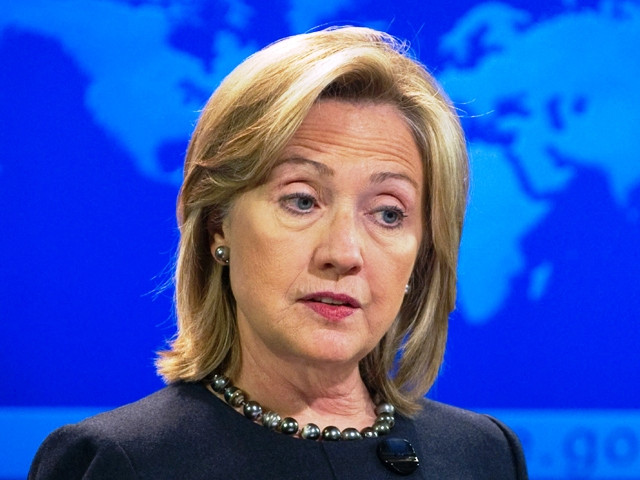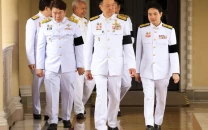Clinton urges stepped-up fight against Islamic State in Syria
Her speech comes day after Republican presidential candidate Jeb Bush said more ground forces will be needed in Iraq

PHOTO: AFP
Speaking at the Council on Foreign Relations in New York, the former secretary of state offered her most expansive view to date on how to counter a growing militancy that launched attacks in Paris last Friday in which 129 people died.
"Our goal is not to deter or contain ISIS, but to defeat and destroy ISIS," she said, using a common acronym for the group, in what amounted to an implicit criticism of Obama, who said days before the Paris attacks that it had been contained.
Clinton, the front-runner for the Democratic presidential nomination for the November 2016 election, called for a "new phase" in the fight against Islamic State and outlined an approach that is more hawkish than Obama's.
Clinton said the United States should increase air strikes and send more special forces to spot targets and get local forces combat-ready, able to reclaim territory lost to militants who have proclaimed a caliphate in parts of Syria and Iraq.
Turning to options Obama has not adopted, she would impose no-fly zones over Syria and safe zones for refugees. However, she opposed deploying large numbers of US troops, saying "local people and nations have to secure their own communities."
"Like President Obama, I do not believe that we should again have 100,000 American troops in combat in the Middle East, that is just not the smart move to make here," she said.
Instead, she said, "We should be sending more special operators, we should be empowering our trainers in Iraq, we should be ... leading an air coalition, using both fighter planes and drones."
Bernie Sanders, a US senator from Vermont who is Clinton’s prime challenger, was unequivocal in his opposition to using more U.S. forces in Iraq. “I will never hesitate to defend this nation, but I will never send our sons and daughters to war under false pretence or pretences or into dubious battles with no end in sight,” he said in a speech at Georgetown University.
Obama has come under heavy criticism in the wake of the Paris attacks for his reliance on air strikes with no capability on the ground to control whatever territory might be cleared of enemy fighters through the use of air power.
The United States currently has 3,400 troops in Iraq and is sending more than 50 more who are special operations forces. Clinton's speech came a day after Republican presidential candidate Jeb Bush said more US ground forces will be needed in Iraq in the wake of the Paris attacks.
Presaging how Republicans plan to take on Clinton, an aide to presidential candidate and Ohio Governor John Kasich said it is hard to take Clinton seriously on the issue because conditions in Iraq and Syria worsened when she was Obama's first-term secretary of state.
"You have to ask yourself what was her role when this was all coming together during the first administration. It’s a little difficult to distance yourself from something that you were basically present at the creation for," said Charles Mallory, national security director for Kasich's campaign.
In the battle to counter Islamic State's propaganda capabilities, Clinton said the United States will need help from American private industry.
Silicon Valley companies, she said, must not view government as its adversary when it comes to formulating counter-terrorism policies, adding that social media companies can help stop terrorism by "swiftly shutting down affiliated accounts."
"Now is the time to solve this problem, not after the next attack," Clinton said. Clinton, who sometimes struggles to relate on the campaign trail, seemed in her element in her hour-long appearance at the Council on Foreign Relations.
While parting ways with Obama to some degree, she hewed closely to his decision to resettle as many as 10,000 Syrian refugees as part of the traditional US welcoming role.
Many Republican candidates and more than two dozen state governors have called for a pause in the resettlement program out of fears militants might sneak into the country. "We cannot allow terrorists to intimidate us into abandoning our values and our humanitarian obligations," she said.



















COMMENTS
Comments are moderated and generally will be posted if they are on-topic and not abusive.
For more information, please see our Comments FAQ